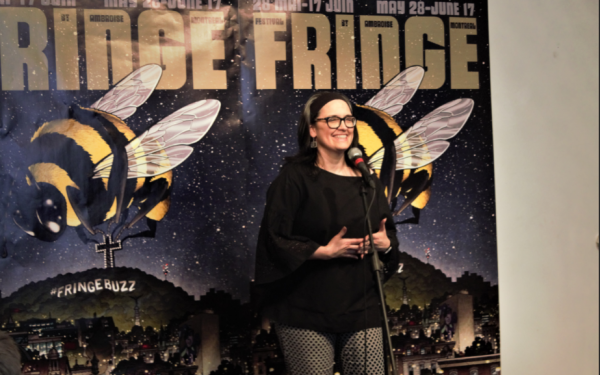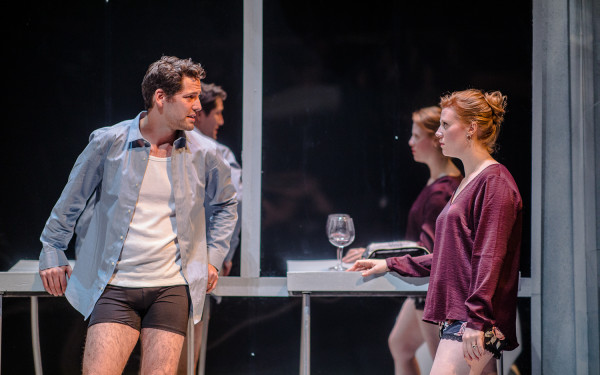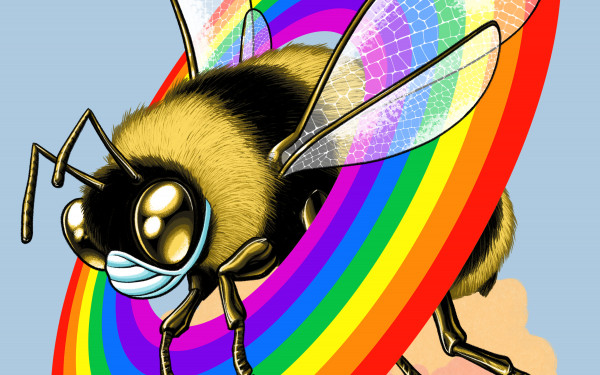Storytelling at the Fringe: “Sex? But I’m Canadian!” Garners Roaring laughter
Relearning Love Through a Married Couple’s Sex Life
On June 14, the crowd was buzzing in anticipation of the show Sex? But I’m Canadian! I walked into a friendly environment which embodied the community-building aspect of the Fringe.
Last Thursday, in the intimate Black Theatre Workshop Studio, storyteller and writer Nico Dicecco delighted with his short-story style comedic show.
“What I love most about performing is connecting with my audience,” said Dicecco. “This show is very intimate. It’s just me, standing there, looking at this roomful of people and we’re sort of mutually feeling each other out.”
Sharply dressed in a navy suit, Dicecco stepped onto the stage and confidently dived into telling the story of a middle-aged married couple living in Ontarian suburbs. We got to witness a year of their marriage, but what a pivotal, life-affirming and decisive year it is for Dale and Marnie.
Sex? But I’m Canadian is a loving parody of the late Stuart McLean, famous for his radio broadcasted series Vinyl Café. Written by Dicecco and his writing partner Kyle Carpenter, the show can be enjoyed without prior knowledge of McLean.
The idea for the show has been around for a few years. In 2013, Dicecco and Carpenter were doing Stuart McLean impressions as a party trick, to entertain their friends.
“This was originally based on a series that a lot of Canadians hold very, very dear, for very good reasons,” explained Dicecco. “Because it’s a parody of that, we wanted people to feel that we were taking care of our source material.”
The idea for Sex? But I’m Canadian! became more serious in 2016, and the pair started to write down stories. Heartbroken after the passing of the Canadian radio broadcaster in 2017, Carpenter and Dicecco created a tribute show, which they have since reworked. The current show stands more independently from McLean, making it easily accessible to those who do not know him.
Through the lens of the couple’s sex life, the audience is privy to a fascinating side of an otherwise deceptively monotonous marital life. The sex scenes are central to the story, yet they are not lewd or superfluous, and give a bit of a bite to the show.
“Ultimately, where [Dale and Marnie] start, is in a very conventional and stereotypical relationship,” explained Dicecco about the characters of his story. “Where they end up is in a place where they have to communicate- they have to connect, and they have to care about one another’s needs, as their own ideas of what is sexually possible in their lives is expanding.”
The show’s main strength is its carefully-crafted narrative that allows for a faultless pacing. The performance is polished and appears effortless—a sign that a lot of care has been put into the show.
“I hope [the audience] takes away the sex positivity of the way it’s been written,” said Dicecco. “We were very careful to think about who Dale and Marnie are as stereotypes, how they’re sort of immediately perceived, and then, to do things that would pull them away from the easy trappings of those stereotypes.”
With the mention of_Fifty Shades of Grey_, it’s Alice Munro gone modern; Dicecco and his writing partner Kyle Carpenter channel the Canadian literary icon’s methodical and complex character building. A banal meal shared between Dale and Marnie at the family house’s kitchen table reveals complicated emotional epiphanies.
The audience gets a glimpse of the inner workings of the couple’s relationship, and are witnesses to complex and subtle mechanisms that push the couple forward in their journey. Dicecco is a skilled orator who got genuine, loud laughter from the audience. The rendition of the text is captivating, but the quality of the fiction steals the show.






